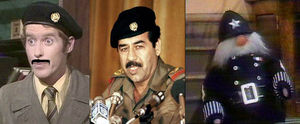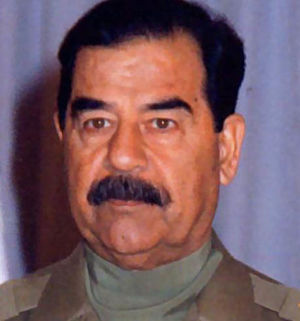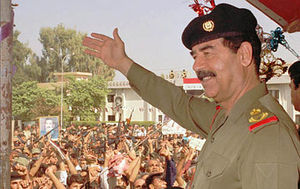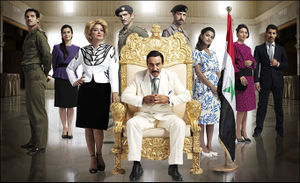Saddam Hussein
Saddam Hussein/al-Majid al-Tikriti (28 April 1937 – 30 December 2006) was the fifth President of Iraq, serving in this capacity from 1979 to 2003. Known for his dark suit and sinister mustache, Saddam modeled himself after Stalin and dressed like a heavy in gangster films. He was a typical brutal dictator, gassing the Kurds with supplies from the United States when he was supposed to be gassing the Iranians. He treated friends, family, and country all alike: if you got on his bad side, you were most definitely dead.
In 1990 Saddam made the critical mistake of attacking Coup Wait to avoid paying some bills. While, up to that point, he'd counted the U.S. as a friend – even having framed photographs of Ron "Old Ray" Gun and Don "Old Rums" Feld on his desk – President George H. W. Bush knew that allowing Hussein to get control of too much oil away scot-free would be a really bad precedent. When the Americans first invaded Iraq during the Gulf War, Hussein was shocked at their ingratitude for fighting against Iran in the 1980s. Hadn't he done what was asked for? Oh, but he forgot something, indeed an important proverb in politics: "Embrace your friends close, but your 'frenemies' closer."
A decade of no-fly zones and economic sanctions later, Hussein was toying with the idea of selling oil in Euros, while sending al-Qaeda operatives to attack the United States on 9/11, while also trying to build a nuclear weapon make use obtain chemical and biological weapons that he actually sold before the turn of the millennium. President George W. Bush sent American forces to invade his country again and captured him in 2003, executing him via an angry moose stampede in 2006.
Early life and education[edit | edit source]
Hussein was born in 1937 in Tikrit, Iraq. He was named "Saddam" meaning "One who resists" in Arabic, due to his failure to succumb to any of his mother's manual abortion attempts.
At a young age, Saddam was sent to live with his uncle Khairallah Talfah; however, after Khairallah uncle was imprisoned for taking part in a nationalist revolution, Saddam was sent to live with his lazy mother and abusive stepfather, who raised him as a thief. After Khairallah was released from jail, Saddam packed his bags and moved back in with his uncle. Raised by his uncle in nationalist, socialist, and Nazi ideas and given a gun for his tenth birthday which he used to shoot a teacher, the young Saddam became a ruthless thug. Few could have imagined this mustachioed child would one day emerge from his poor surroundings to become one of the most intelligent, manipulative, and charismatic political leaders of his era.
From a young age, Saddam felt strongly about the political issues of the day. He was an admirer of Adolf, Stalin, the Mafia, and Roosevelt, and deeply respected his uncle for fighting the treacherous beady-eyed Anglo in the Anglo-Iraqi War of 1941. He despised Israel, viewing it as an outpost of colonialism in the region (in honor of Saddam, Tulfah would later author Three Whom God Should Not Have Created: Persians, Jews, and Flies). Nonetheless, Saddam maintained a certain degree of respect for America, admiring their technological achievements as well as their culture of baseball, hot dogs, Mom's apple pie, and Chevrolet.
Saddam studied briefly at an Iraqi law school but dropped out in 1957 to join the Arab Socialist Ba'ath Party that would later dominate the country. Founded by Syrian Christians, the party was based on such principles as Arab nationalism, anti-Communism, staunch secularism, anti-capitalism, and educational advancement. It was an outspoken advocate for improving women's rights in the Arab world and for abolishhing the political power of the clergy. A year later, he celebrated when King Faisal II was overthrown and his body dragged through the streets of Baghdad. The Ba'ath party took part in the revolution which saw Iraq change from a monarchy into a republic.
In 1958 Saddam married his uncle's daughter Sajida. Considering Saddam had barely finished school and could read only comics, it was remarkable promotion. The marriage produced a couple of monsters; more on them later.
Rise to power[edit | edit source]
In 1968 the Ba'athists overthrew the president and began their one-party rule. They were supposed to be a party of modernizers and looked to President Nasser in Egypt as a role model. This was an era when the 'backward' Arabs were those in Saudi Arabia and the Gulf states. To mark themselves as different, the Ba'athists encouraged supporters to wear suits and ties, indeed they became particularly snazzy dressers and would order expensive suits from London, Paris, or Milan. Hussein made himself indispensable during this time, happily killing off all opposition and modeling his "look" on a bespoke Joseph Stalin.
But there were plenty of other Ba'athists who wanted to be president. Hussein moved first and persuaded President Ahmed Hassan al-Bakr to resign or never see his fingers again. Saddam then convened a Ba'ath party meeting and read out a long list of names. Those on it who first thought they were in for a promotion, were told to go outside where Saddam's soldiers executed them. All this was shown on Iraq TV, in between the cartoons and weather reports. Saddam said: "If Stalin had had TV ... he would have done the same."
On an unknown date Saddam created an infamous woman's panties company. At first, it was a commercial success. But word got out that every panty was hand-tested and worn by Saddam himself. Disgusted with the thought of Saddam's dirty brown hairy genitalia touching the panties they bought society turned their back on this short-lived but controversial brand.
Presidency of Iraq[edit | edit source]
Saddam Hussein assumed office and ordered that day to be a national holiday. People who would years later claim to have "always known he was bad" came forward and offered to build statues, construct streets and squares in commemoration of their new leader. All men grew a "Saddam" on his upper lip to emulate his new "hero". Women were told to not wear the veil and to dress like a cheerleader (if he was in town). It was a new modern Iraq; it had oil and it had some good friends.
These included French politician Jacques Chirac and the Soviet Union. From the former, Iraq gained access to a lot of French weapons and cheeses in exchange for cheap oil. The Russians got the same but they also supplied training facilities for anyone in Iraq who wanted to join the security services.
Iran–Iraq War[edit | edit source]
With his new friends, Saddam now aided the Americans when he invaded Iran in 1980. This won him support from NATO and Saudi Arabia, who were scared "shiite-less" by the prospect of bearded revolutionary Islam.
With so many friends abroad, Saddam expressed disappointment when not everyone in Iraq supported him. He used poison gas on those people, especially in the North. Hussein also used various chemical concoctions against the Iranians who were using military tactics out of World War One in an attempt to beat Iraq. The war didn't go well and in 1987 Saddam tried a new test when his army fired a missile at the USS Stark. Perhaps he was hoping the Americans were going to confuse Iraq with Iran and join the war against them. However, President Reagan was elsewhere engaged in Central America so the opportunity for Iraq was missed.
Often nicknamed "World War I in the Cold War", this conflict consisted of large-scale trench warfare with barbed wire stretched across trenches, manned machine-gun posts, bayonet charges, and human wave attacks across a no-man's land, and extensive use of chemical weapons such as mustard gas. Half a million Iraqi and Iranian soldiers, with an equivalent number of civilians, were killed in this war. Nevertheless, there were absolutely no reparations or border changes, making the entire thing a pointless waste of time, all because Saddam wanted to flex his muscles over an old rival.
The war with Iran ended with a truce in 1988. There were brief celebrations in Baghdad until Saddam Hussein opened his post and was told all his international friends had withdrawn and cut up Iraq's credit cards. In fury, Saddam blamed everyone but decided that as Kuwait was the closest, they would get the bulk of it.
Gulf War[edit | edit source]
The Gulf War of 1990–91 saw one of the biggest coalitions assembled in history. In effect, it was Iraq and the PLO against the rest. Even Syria and France sent an army to invade a country they had helped to arm in the first place. For Saddam Hussein, he now went from "Hero Against Iranian Beardies" to "Worst Tyrant Since the Last One". Now also all those who had rebelled before were encouraged to join in the struggle.
Saddam took action against Israel with some old Second World technology known as Scud missiles. These Russian Friday Afternoon manufactured military antiques (sort of dumb drones) were possibly more dangerous for those who used them but they looked good on CNN when they exploded or showed the smooth-talking Israeli government spokesmen putting on gas masks.
The war in Kuwait ended when Saddam's army was routed and fled back to Iraq. This kick-started a new rebellion in Iraq. Saddam once again turned to his old mentor Stalin about what to do. More blood in the Euphrates and Tigris. This time Saddam was on his own. The French no longer sent anything to him and the Soviet Union had gone up in smoke. To his enemies, this must mean curtains? No. But for Saddam's only son-in-laws it did.
Family Killer Guy[edit | edit source]
The aftermath of the war in Kuwait and United Nations sanctions restricted Saddam Hussein's movements. Never one to travel anywhere (his only official trip outside the Muslim world was to France to collect some envelopes from his friend Jacques Chirac), Saddam lived in armed compounds. He distrusted everyone, including that guy he saw in the bathroom mirror every time he shaved. He also insisted that his family visit every Friday after prayers, their absence without cause would be judged as treason. In his place, Saddam's sons Uday Insane Hussein and Qusay Insane Hussein traveled around Iraq dispensing injustice and retribution. It was a backhanded way to make Iraqi people nostalgic for their mentally entombed president.
In 1995 Saddam's son-in-law Hussein Kamel al-Majid and Saddam Kamel had enough of this and moved to Jordan with their families. Saddam threatened and then sent videos to them crying that everyone back in Baghdad missed them. Both returned and were killed in a gunfight straight out of the Godfather. Their deaths were reported in Iraq as traffic accidents with an ammunition truck.
9/11 attacks[edit | edit source]
In 2001, at the Baghdad International Airport, when Osama bin Laden was in transit with his jihadis, he decided to call Saddam on the phone. He informed Saddam they were "planning an attack on the infidel imperialists," and that he would "send [Saddam]] a text if [they] are successful." Hussein revealed during this phone call that he had "stopped wearing Western ties"; he also revealed he was more of a Sunni guy when compared to Shia.
Hussein didn't receive another text from bin Laden, and so was slow to respond to the 9/11 attack on the USA. This explains the strange press release issued by Hussein which said 'no comment' in 13 languages. Saddam predicted that Americans were the Mothers of All Bullshit and retired to his compound to read more about Stalin.
President George W. Bush took this as an insult to his mother Barbara Bush and put together an invasion plan. Saddam had to withdraw what he had said about Bush's mother and, by the way, does your country contain any chemical/nuclear/big bomb bangers that anyone should know about. Lack of proof that you didn't would be a cause of war. Since Saddam didn't understand Poker, he thought that was a bluff.
Iraq War and capture[edit | edit source]
In March 2003, an American led-force invaded Iraq. A month later, Saddam's statues were pulled off their pedestals. In a last attempt to fool the allies, Saddam's secret arsenal of his look-a-likes was released to confuse the enemy. After arresting and/or killing a number of "Saddams", the American troops found Uday Hussein and Qusay Hussein and killed them in an Iraqi remake of Butch Cassidy and the Sundance Kid.
Meanwhile, Hussein had grown a big beard and got a job inspecting the sewerage system around the new 'Green Zone', the allied compound in the center of Baghdad.

Death[edit | edit source]
Saddam could have kept hidden for long, but trying to keep a conversation about how to recycle shit in a busy city tried his patience. He finally admitted who he was really, got a comic book trial, and was executed by Islamic Representatives of YouTube for crimes against humanity.
In spite of Saddam's death, Iraq is still suffering through a period where their dictator isn't providing electricity to their homes (and that's the idealistic take on what happened).
Parts of this page were originally sporked from RationalWikia. |





